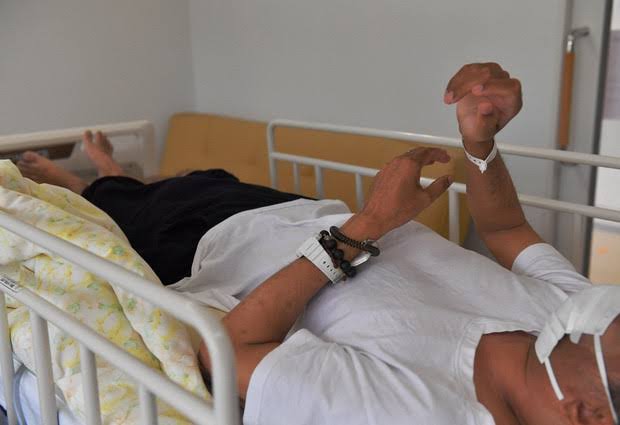Nepalese man sues Japan gov’t after injury at detention centre

A Nepalese man who became bedridden after not being allowed to see a doctor for about four months after he was injured at an immigration detention facility in Nagasaki Prefecture is suing the Japanese government, demanding money for medical treatment.
Following the passage of a bill to revise Japan’s Immigration Control and Refugee Recognition Act on June 9, the Nepalese man in his 40s, whose alias is “Ram” in this article, appealed, “I want the immigration agency to listen to us properly and not discriminate against us.”
Ram suffered from a disease that caused necrosis of his hip bone while in the Omura Immigration Center in the Nagasaki Prefecture city of Omura, and now struggles to walk.
He came to Japan in May 2009 and worked at Indian restaurants in the Kanto region in east Japan and elsewhere for about nine years, but he could not renew his visa in September 2018 and as a result overstayed in the country. Ram was detained at the Tokyo Regional Immigration Services Bureau in the capital’s Minato Ward the following month, and transferred to the Omura Immigration Center in January 2019.
That April, Ram injured his left hip joint in a collision with another inmate while playing soccer at the facility. He requested to see an outside medical institution, but the request was not immediately approved, and he was not permitted to do so until August, about four months later.
Ram was diagnosed with “osteonecrosis of the femoral head,” a condition that causes necrosis at the tip of the femur, and by February 2020 he was almost bedridden. He was released from detention under a special exception in December 2022 and admitted to a hospital in the city of Fukuoka. Ram can no longer move his left leg and can only move his right leg a few centimeters. He often wakes up at night in pain.
Ram said weakly, “When I complained to immigration center employees about the pain, they told me to ‘be patient,’ and when I cried out in agony, they said I was just faking it. If I had been taken to the hospital earlier, this would not have happened.”
Ram has taken the matter to court and is seeking state redress for medical treatment. His lawyer Hikari Tsuji pointed out that long-term detention is one of the reasons these cases occur at detention facilities, and said, “Even after the law is revised, there will be no limit to the detention period, and it is unlikely that treatment will be improved.”
Citing the death of Sri Lankan woman Wishma Sandamali at the Nagoya Regional Immigration Bureau detention facility in March 2021, Tsuji warned, “This is a systemic problem in that foreigners are regarded as being subject to exclusion and not given proper treatment, based on suspicions they were faking illness. The current situation of neglecting the human rights of foreigners remains unchanged, and the legal revision seems to only strengthen the authority of the immigration agency.”
On the other hand, the revised immigration law will establish a new system to allow individuals who are considered equivalent to refugees to stay in Japan as “persons under supplementary protection,” even if they do not meet the criteria for recognition under the Refugee Convention.
Kazuma Ono, 37, who lives in the Oita Prefecture city of Beppu and supports Ukrainian evacuees in Oita, Fukuoka and Nagasaki prefectures and elsewhere with his Ukrainian wife, appreciates the system to some extent. He said, “Ukrainian evacuees are currently staying in Japan on a visa for specified activities, but it is difficult to envision their future because the visa must be renewed every year. If they can work and live as permanent residents under the new system, they will be able to live in Japan with more stability.”
Ono added, “The number of people granted refugee status in Japan is low in the first place, and the social conditions for accepting refugees are not sufficient. I hope that the acceptance of Ukrainians under the supplementary protection system will trigger future discussions on refugee protection.”




